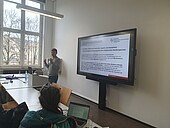"Social work as a place of political education" was the title of a conference held at the Cologne University of Applied Sciences from November 22 to 23. The conference was organized by the research focus on non-formal education at the Institute for Childhood, Youth, Family and Adults in cooperation with the German Society for Social Work and the Society for Political Didactics and Political Youth and Adult Education.
Several educators from the Department of Social and Health Care at the HWG Ludwigshafen were able to contribute to the conference with their own program offerings. Norman Böttcher, deputy professor of social work science at the Department, and social economist Prof. Dr. Jörg Reitzig, head of the Master's degree course in Social Work, were given the opportunity by the organizers to offer a thematic panel on the second day of the conference. In this panel, the question of what constitutes social work as a place of political education and democratic engagement was examined from different perspectives. Located in the conference's thematic field of "Political education, political action and professional solidarity of social work professionals", the focus was on the dialectical connections between behavior and circumstances and the thesis that distribution issues, interests and the ability to deal with conflict are key issues for the 21st century.
In a first step, Prof. Reitzig presented macroeconomic and democratic theoretical considerations in order to outline the challenges of the welfare state, which are also relevant to the field of social work. The second step dealt with funding structures and the conceptual orientation of political education. In this area, two social workers, Benny Momper and Thure Alting, were involved in the planning and implementation of the panel as practice partners. Momper and Alting work full-time as education officers at the Spiegelbild association in Wiesbaden, which sees itself as a point of contact against anti-Semitism and group-related misanthropy. In a third step, Norman Böttcher then focused on the action level using the example of self-organized, community-oriented youth work in Mannheim. Among other things, he picked up on buried reflections from the professionalization debates of the 1970s and 80s, which were taken up and appreciated with interest by the audience in the concluding debate.
The lecture by Maria Diedrich, who is currently also a professor in the social work department, was already scheduled for the first day of the conference. Due to illness, she was unable to present her own analysis of the relationship between democracy and right-wing movements in educational processes and the democratic potential of social work. However, some of her research findings were acknowledged in Dr. Paul Erxleben's lecture on the contradictions of mobile counselling against right-wing extremism. Erxleben was a research assistant and lecturer at the Department of Social and Health Care at the HWG in 2021/22. He now works at the Institute of Educational Sciences at the University of Marburg.
The organizers are planning a summary documentation of the conference, which will hopefully reflect the broad spectrum of contributions and the state of the debate on the conference's leitmotif.

